
An epidemic prevention employee sprays disinfectant at a workshop to prepare for resuming work in Qingdao, East China's Shandong province, on Feb 9, 2020. (PHOTO / XINHUA)BEIJING — Many big farm produce wholesale markets and supermarket chains returned to normal operation on Monday, an official with the Ministry of Commerce said.
Fifty big wholesale markets of agricultural products supervised by the ministry have opened for business, Zhu Xiaoliang, director of the ministry's market system development department, told an online press conference.
Over 92 percent of more than 7,000 supermarket outlets in 34 large and medium-sized cities across the country have also resumed operation, he said.
The wholesale prices of pork, beef and mutton went up 3.5 percent, 0.7 percent and 0.5 percent, respectively, over the past three weeks
The ministry will continue to closely monitor the operation of wholesale markets and commercial outlets to keep track of inventory and price changes and ensure sufficient supplies of daily necessities, Zhu said.
The country has released frozen pork reserves and increased imports to ensure supplies of food and medical gear amid the novel coronavirus outbreak.
The latest official data showed that the wholesale price of grain edged up 0.2 percent from three weeks ago, while that of eggs fell 9.7 percent during the period.
The wholesale prices of pork, beef and mutton went up 3.5 percent, 0.7 percent and 0.5 percent, respectively, over the past three weeks. While 30 types of vegetables saw prices rise 10.7 percent, six kinds of fruits registered a mild hike of 1.7 percent.
NO PANIC BUYING
Except for fresh meat and some leafy vegetables, most essentials are in abundant supply in Wuhan, the epicenter of the outbreak, Zhu said, adding that there was no obvious panic buying in the city.
 A man cleans up a factory in order to prepare for resuming work in Qingdao, East China's Shandong province, on Feb 9, 2020. (PHOTO / XINHUA)
A man cleans up a factory in order to prepare for resuming work in Qingdao, East China's Shandong province, on Feb 9, 2020. (PHOTO / XINHUA)
The two biggest local wholesale markets have reopened for business, with daily transactions exceeding 3,000 tonnes, he added.
As part of its efforts to ensure supplies in the city, the country allocated 2,000 tonnes of frozen pork to Wuhan last week
As part of its efforts to ensure supplies in the city, the country allocated 2,000 tonnes of frozen pork to Wuhan last week.
The ministry has also built an efficient supply network of daily necessities across nine provinces to strengthen inter-provincial cooperation and coordination.
Since Jan. 23, eight provincial-level regions such as Chongqing and Guangxi have sent over 6,800 tonnes of vegetables, 20 tonnes of edible oil and 200 tonnes of convenience food to the hardest-hit Hubei Province.
More than 4,000 tonnes of donated vegetables have been released in Wuhan since Jan. 29 and an additional 3,500 tonnes can be put on the market soon, Zhu said, while pledging more efforts from the ministry to ensure supplies and stable prices in Wuhan.
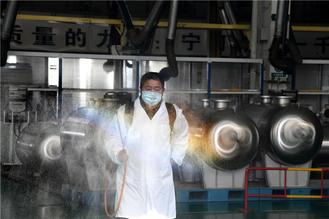 An epidemic prevention employee sprays disinfectant at a workshop to prepare for resuming work in Qingdao, East China's Shandong province, on Feb 9, 2020. (PHOTO / XINHUA)
An epidemic prevention employee sprays disinfectant at a workshop to prepare for resuming work in Qingdao, East China's Shandong province, on Feb 9, 2020. (PHOTO / XINHUA)
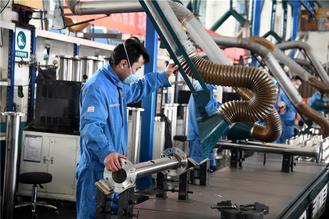 A man checks equipment to prepare for resuming work in Qingdao, East China's Shandong province, on Feb 9, 2020. (PHOTO / XINHUA)
A man checks equipment to prepare for resuming work in Qingdao, East China's Shandong province, on Feb 9, 2020. (PHOTO / XINHUA)
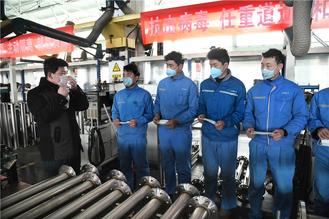 Staff members accept training to prepare for resuming work in Qingdao, East China's Shandong province, on Feb 9, 2020. (PHOTO / XINHUA)
Staff members accept training to prepare for resuming work in Qingdao, East China's Shandong province, on Feb 9, 2020. (PHOTO / XINHUA)
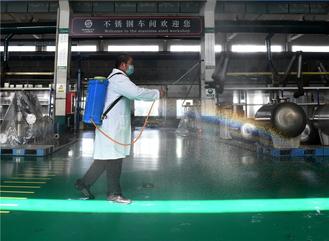 An epidemic prevention employee sprays disinfectant at a workshop to prepare for resuming work in Qingdao, East China's Shandong province, on Feb 9, 2020. (PHOTO / XINHUA)
An epidemic prevention employee sprays disinfectant at a workshop to prepare for resuming work in Qingdao, East China's Shandong province, on Feb 9, 2020. (PHOTO / XINHUA)
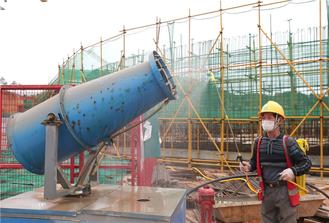 A man disinfects equipment at a sewage treatment plant construction site in Nanning, South China's Guangxi Zhuang autonomous region, on Feb 9, 2020. (PHOTO / XINHUA)
A man disinfects equipment at a sewage treatment plant construction site in Nanning, South China's Guangxi Zhuang autonomous region, on Feb 9, 2020. (PHOTO / XINHUA)
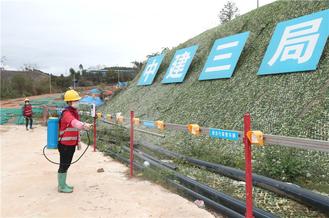 A man disinfects a fence at a sewage treatment plant construction site in Nanning, South China's Guangxi Zhuang autonomous region, on Feb 9, 2020. (PHOTO / XINHUA)
A man disinfects a fence at a sewage treatment plant construction site in Nanning, South China's Guangxi Zhuang autonomous region, on Feb 9, 2020. (PHOTO / XINHUA)
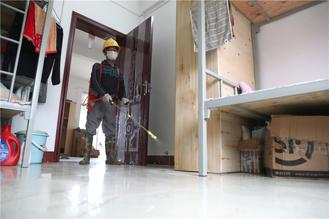 A man disinfects a dorm of staff members to prepare for resuming work in Nanning, South China's Guangxi Zhuang autonomous region, on Feb 9, 2020. (PHOTO / XINHUA)
A man disinfects a dorm of staff members to prepare for resuming work in Nanning, South China's Guangxi Zhuang autonomous region, on Feb 9, 2020. (PHOTO / XINHUA)


